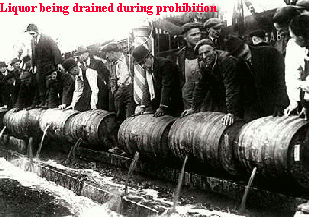Prohibition In United States – Economics And Consequences
People value liberty and egalitarianism and demand them more often from the society. The right to live a life according to their whims is every individual’s dream but shows the faintest hint of occurrence. Eighteenth Amendment to the Constitution and the Volstead Act mandated a nationwide ban on the sale, production and transportation of alcohol in the United States, which went down in history as Prohibition in the United States. The law came into effect from 1920 by strictly banning possession outrights and private ownership/consumption of alcohol and terminated with the endorsing of the Twenty-first Amendment in 1993.

Nevertheless, the news of prohibition was welcomed by individuals who were hunting for profit till then. It was anticipated that the textile industry, real estate developers, landlords, companies manufacturing gum, grape juice and soft drinks would reap benefits, but the events took an alternative turn by casting down the United States. The entertainment industry and restaurants faced the severest of the ill-effects as the people couldn’t find another source of amusement. Theatres, which once witnessed the swarms of people flocking in reached a fix where they had to shut down the theatres owing to the decline in revenue. Many were left jobless due to the closing down of breweries, distilleries, saloons and the like. Moreover, the revenue of government itself was at stake. With no taxes from liquor sales, the United States were on the brim of a mild crisis.
Although prohibition was meant for protection and advantageous to the populace, it eventually secured the whole contempt of the whole nation. This further led to organized crimes such as transporting liquor, violence, murder, prostitution, drugs and theft. Around half of the United States took an active part in organized crime and thus had a great hand over bureaucracy and judicial systems. Crime activity ascended in proportion to the augmentation of immorality. Evangelicals, a conservative group, proclaimed themselves against alcohols and cajoled people into joining them. This made the populace abstain themselves from religion and tread through the path of crime and drugs. In addition to these mediocre outcomes, people started to find solace on smoking. Smoking became their rebellion. The aftermath of the prohibition was very pathetic.
John Stuart Mill, an English political philosopher and economist elucidated as, “The proper role of government is to prevent other people from harming an individual. The case for prohibiting drugs is exactly as strong and as weak as the case for prohibiting people from overeating. We all know that overeating causes more deaths than drugs do”. The prohibition in the United States has left a stain on the history and economics of the nation. Nevertheless, people took interest in drinking cocktails were born for the first time.
For more updates, keep visiting us fiscaltoday.com
By G+ Author: Chrissy Reese.
Chrissy Reese
Latest posts by Chrissy Reese (see all)
- College Financial Aid Questions and Answers - December 7, 2015
- Best Mobile Banking Apps - September 28, 2015
- Best Mortgage Companies of 2015 (so far) - June 22, 2015
